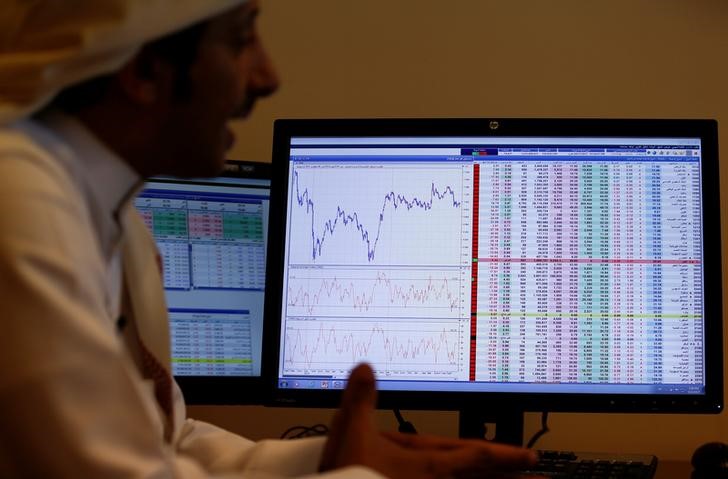
An investor gestures as he monitors a screen displaying stock information in Riyadh, Saudi Arabia, November 6, 2017. REUTERS/Faisal Al Nasser
December 31, 2017
By Andrew Torchia
DUBAI (Reuters) – Middle East fund managers plan to boost their equity holdings after a very weak year in which the region underperformed emerging markets globally because of geopolitics and slow economic growth, a Reuters poll showed on Sunday.
Egypt’s stock market surged to record highs in 2017 as economic reforms took hold but Gulf Cooperation Council markets sagged, with Dubai’s index <.DFMGI> falling 4.6 percent and Saudi Arabia <.TASI> almost flat. By contrast, MSCI’s emerging markets index <.MSCIEF> soared 34 percent.
As a result, Middle East and North African equity funds returned just 2.5 percent on average in the year through November, compared with more than 21 percent for global emerging market equity funds, according to calculations by Citywire using data from Lipper, a Reuters company.
“The year 2017 will long be remembered in the GCC, unfortunately for probably all the wrong reasons,” said Akber Khan, head of asset management at Al Rayan Investment in Doha, where the market was hit by an economic boycott imposed on Qatar by four other Arab states.
The latest monthly Reuters poll of 13 leading regional fund managers, conducted over the past 10 days, shows many funds will bet on 2018 being better.
Fifty-four percent expect to raise their allocations to Middle Eastern equities over the next three months and none to reduce them, the most positive balance since August. In the previous poll, the ratios were 46 percent and zero.
GCC markets’ underperformance has narrowed and in some cases even reversed the region’s longstanding overvaluation compared with emerging markets, managers said.
“Regional stock markets are among the worst performers in the world this year, so valuations are a positive for some stocks,” said Khan.
Meanwhile, the Brent oil price’s <LCOc1> surge to 2-1/2 year highs above $65 a barrel in the last few months has given several GCC governments, including Saudi Arabia and Abu Dhabi, room to boost spending moderately in 2018 after over two years of austerity.
“The equity outlook for 2018 gives us comfort as the biggest revenue generator for the GCC – crude oil – has found its base, which has led to more accommodative fiscal policies,” said Bader al-Ghanim, head of regional asset management at Kuwait-based Global Investment House.
“With this backdrop and underpinned by undemanding valuations, we are generally optimistic on the GCC for the year 2018, with the outlook ranging from slightly negative to moderately bullish across the board.”
However, Ghanim and other managers said geopolitics – including the risk of an escalation in tensions between Iran and Saudi Arabia – remained a major risk for the region.
By far the most favored stock market is Saudi Arabia. Sixty-nine percent of managers expect to increase equity allocations there and only 8 percent to reduce them, the most positive balance since March 2017.
A major reason is the release of Riyadh’s state budget in mid-December; authorities said they would increase spending modestly while pushing back the target date for balancing the budget by three years, partly by spreading hikes in domestic energy prices over a much longer period.
That should allow a rebound of economic growth next year and give the bottom lines of many Saudi companies more time to adjust to painful reforms.
“It is a positive that the kingdom is moving the target year for eliminating its deficit to 2023 from 2020,” said Vrajesh Bhandari, portfolio manager at Dubai-based Al Mal Capital. “This suggests continued focus on capital expenditure, which drives economic growth.”
Fund managers are also expecting good news from international index compilers next year. MSCI will announce in June 2018 whether it will add Saudi Arabia to its emerging markets index, while FTSE has said it will probably decide next March to do so.
These decisions, as well as the planned listing of national oil giant Saudi Aramco in Riyadh late next year, may attract new flows of foreign funds to the Saudi market.
A sweeping crackdown on corruption launched by Saudi authorities rattled the stock market briefly in November but managers said it was not a long-term negative for the market, as the effect on the real economy had been negligible.
(Reporting by Andrew Torchia; Editing by Alison Williams)

